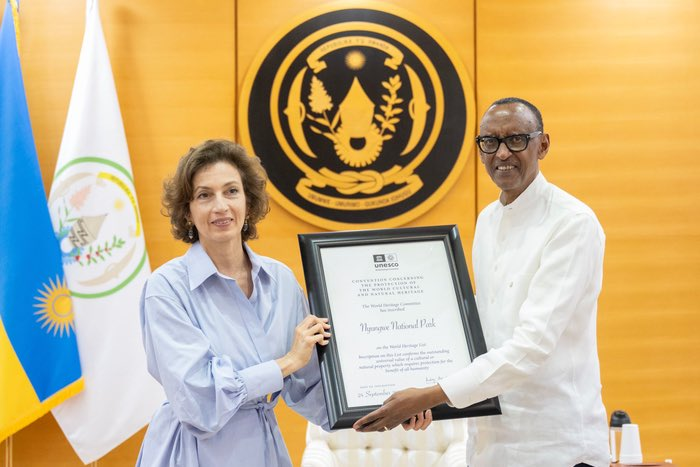
UNESCO Boss Audrey Azoulay
UNESCO’s Director General (DG) is in Rwanda from 5-7 April to participate in the commemorations of the 30th anniversary of the genocide against the Tutsis. She will discuss UNESCO’s efforts to teach new generations about violent pasts, following the recent inscription of four of the country’s memorial sites on UNESCO’s World Heritage List.
On the morning of Saturday 6 April, Audrey Azoulay will visit the Murambi Memorial in the south-west of the country, where she will meet survivors and the managers of the site. In April 1994, nearly 50,000 Tutsis were killed in the grounds of this technical school built in the early ‘90s.
In September 2023, the Murambi Memorial was inscribed on UNESCO’s World Heritage List, alongside The Nyamata, Gisozi and Bissero Memorials, in recognition of the role they play in national reconciliation, and in promoting understanding of the events and helping to pass history on to future generations.
On the occasion of her visit to Rwanda, the Director-General of UNESCO will present the Rwandan government with the official certificate of inscription of these four memorials on the World Heritage List.
On Sunday 7 April, Audrey Azoulay will participate in the official commemorations in the Rwandan capital. The events will begin with a ceremony to rekindle the flame at the Gisozi Memorial, and will continue at the Kigali Arena; some 10,000 people are expected to be present.
On the same day, at its Paris headquarters, UNESCO will hold a ceremony in memory of, and in homage to the victims, at the initiative of the permanent delegation of Rwanda. In the evening, at the invitation of UNESCO and Rwanda, 10 metropolises around the world will participate in this commemoration by lighting up one of their monuments.
UNESCO is committed to preserving the memory of the genocide
The genocide against the Tutsis took the lives of nearly a million people. As the United Nations’ agency for education, UNESCO works to pass on the memory of this tragedy, so that it can never happen again.
Since 2015, UNESCO has been working with Rwanda to integrate teaching about the genocide into curricula and classrooms. A dedicated team has been set up by the country. UNESCO provides training, publishes teaching guides and connects Rwandan professionals with those in other countries facing similar challenges, such as Cambodia.
In 2023, a network of twenty local mediators was set up with the help of UNESCO, in order to pass on the memory of the genocide to local communities and to young people unable to attend school.
UNESCO implements its International Programme on Education about the Holocaust and Genocides in twenty-three other countries, in partnership with the United States Holocaust Memorial Museum. The Organization has also edited a series of publications for teachers and public decision-makers, to guide them in teaching about genocides and mass atrocities.
With 194 Member States, the United Nations Educational, Scientific and Cultural Organization(UNESCO) contributes to peace and security by leading multilateral cooperation on education, science, culture, communication and information. (End)
